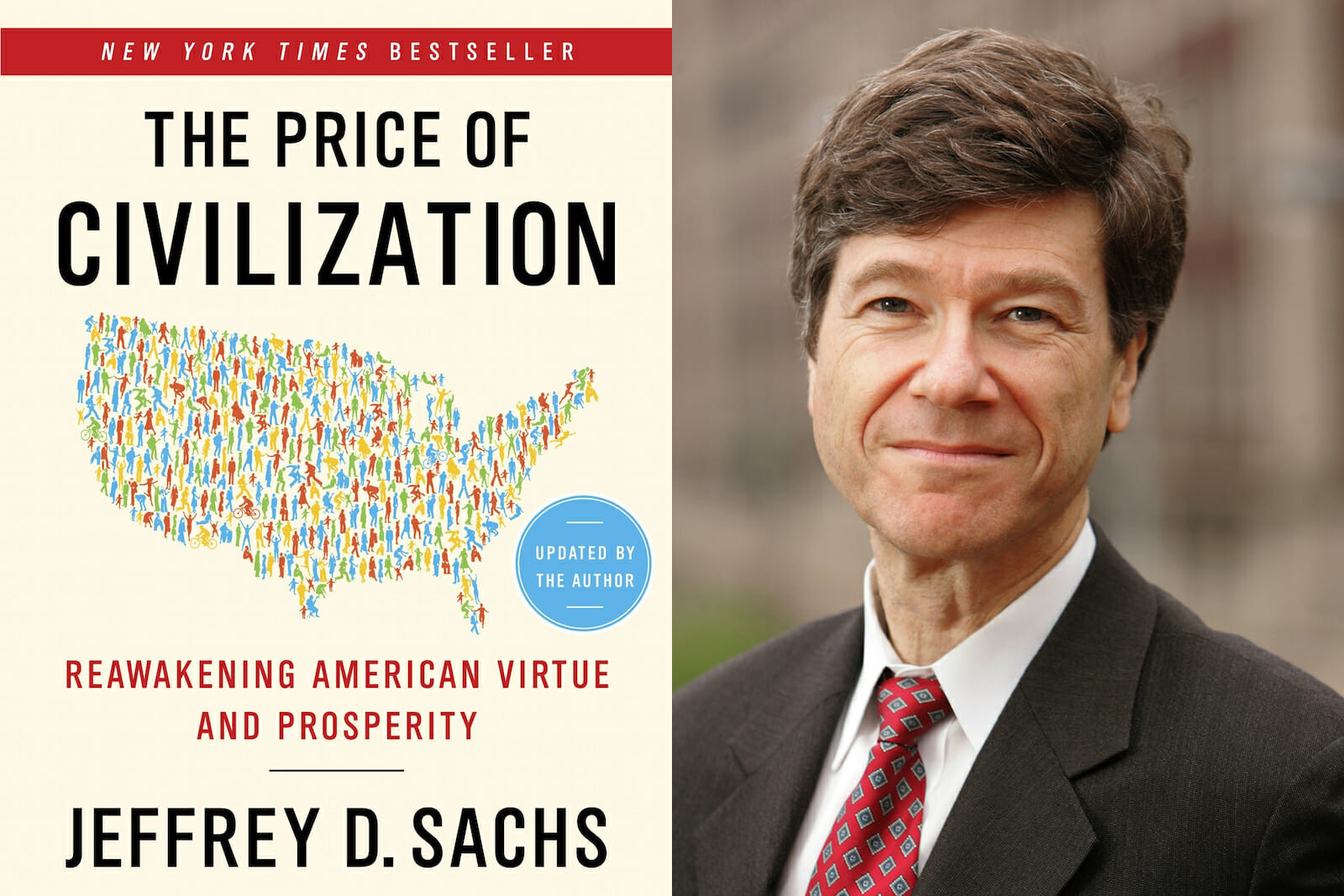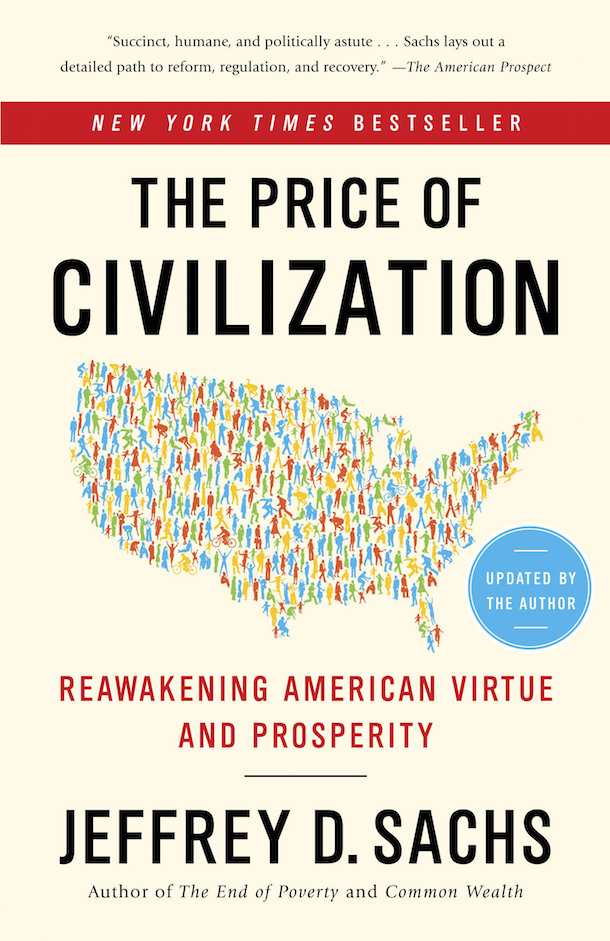
Books
Jeffrey Sachs and ‘The Price of Civilization’
Professor Jeffrey D. Sachs, director of the Earth Institute at Columbia University, was named among the 100 most influential leaders in the world by Time Magazine in 2004 and 2005. Sachs, the Quetelet Professor of Sustainable Development and Professor of Health Policy and Management at Columbia University, is also Special Advisor to United Nations Secretary-General Ban Ki-moon. From 2002 to 2006, he was Director of the UN Millennium Project and Special Advisor to United Nations Secretary-General Kofi Annan on the Millennium Development Goals, the internationally agreed goals to reduce extreme poverty, disease, and hunger by 2015.
Sachs is also President and Co-Founder of Millennium Promise Alliance, a nonprofit organization aimed at ending extreme global poverty. He is author of many books, including the New York Times bestsellers Common Wealth: Economics for a Crowded Planet (Penguin 2008) and The End of Poverty (Penguin, 2005). His most recent work, The Price of Civilization: Reawakening American Virtue and Prosperity, has just come out and is already the subject of controversy. By the time Sachs arrived at the Barnes and Noble Bookstore on 82nd and Broadway in New York, the place was packed with intent listeners, many sprawled on the ground. A group of Polish economists stood near me—the chairs were gone; many neighborhood characters had turned out. And with the exception of the blonde economists, the heads of hair tended more towards the gray than black or brown. Hardly a suit in the crowd.
Sachs began by proudly declaring that this was his neighborhood bookstore and he loved it. He was happy to see local people he knows here for the talk on his new book, The Price of Civilization, re: our current political debacle and the decline of our traditional morals and ethics. The book, said Sachs, is an attempt to step back from Washington, take a deep breath, and get a sense of our true values. Our original values, he said, were pretty good ones.
His overall message, he said was a simple one, “Throw the bums out!” And yes—he means the bums of both houses of Congress. The government’s actions, according to Sachs, are incommensurate with what he believes are the deeper and more dangerous challenges – the crises of finding jobs and balancing the federal budget.
And, he said, these crises had not started as proclaimed in 2008 with the tumble of Goldman Sachs or after 9/11. He wants us to try to understand more deeply—to realize that these crises actually date back 30 to 40 years, with their origins in the 1970s. According to Sachs, in 1981, people began to understand that the country had taken the wrong path but they did not understand the reasons. The platform or diagnosis of what ails America was wrong but people grabbed onto it. And this erroneous diagnosis persists on Capitol Hill. Sadly, “President Obama” said Sachs, “has not changed the direction of the country or the nature of politics.”
The 2008 Lehman Brothers economic disaster was the end of a bubble. It exposed the illegality of many of Wall Street’s actions (Sachs attempted to get Obama to address this crisis by stopping the gigantic year-end Wall Street bonuses, which would have released billions of dollars back into the system, but was unsuccessful). Further, according to Sachs, “Many took this 2008 shock as a unique event but also as a bump in the road. It was assumed that once we’d passed this bump we’d get back on track. Not so. Obama has tried without success to make a bunch of quick fixes to ‘rev up’ the economy. He attempted to put into place several stimulus packages. Now, at the end of 2010, we are on our second round of tax cuts. Obama is ramping up a new jobs stimulus package for 2013. But nothing is ‘revving up.’ In fact, we are facing a new downturn.” Sachs continued, “So let’s take a step back. The single most important change in the world economy since the 1970’s is that it has a new face.”

In the 1970s, the U.S., Europe, and Japan were the world’s strongest economic players. “But 40 years later we are fully metamorphosed into a global economy with many more members. China is the #2 country with 1.33 billion people — the world’s most populous country. It has 10% growth every 7 years. Since the 70’s, that means it has achieved 10% growth 32 times.” He invited the audience to do the math. “China, and the world,” says Sachs, “have drastically changed. China’s enormous changes have changed the US economy too. In 1976 Mao Tse Tung died, Deng Xiao Ping, who replaced Mao, was-the most influential world leader in economic terms the world has seen. He opened China up to market forces and he did significant damage to our own economy.”
“Japan, our sometime close ally, became our rival in the cars it was producing and that people were buying. The US was no longer the sole or primary producer. We also went through a series of trade frictions in 1973 and 79. Very tough times,” Sachs argues. In regard to the Soviet Union, argues Sachs, “the US believed that it had to play a world game — the Cold War. We battled endlessly with what was a 4th or 5th grade collapsing upper power. It is no longer a super power and all that effort was expended for naught.”
Sachs said that Reagan made an economic diagnosis at this time of America’s condition that was and still is very popular. “Government here is not the solution to our problems. Government is the problem.” Reagan said, “This country began with a tax revolt. And it was time for another one. The American people are still paying too many taxes to the government.” Reagan announced another tax revolt. Sachs said that this was a decisive moment, even a pivotal one, and “A watershed from which we have never really emerged. All presidents since Reagan have accepted this concept, even Clinton and Obama.”
But Sachs felt it was a very bad diagnosis. “And a bad diagnosis means bad treatment of our sick body politic. It has led to our keeping the level of taxation at what it was in Reagan’s day- 18.5%- thereby depriving the population of what it desperately needs, like decent healthcare and education while the rest of the world, especially Europe, which has raised its taxes commensurate with needs, has been able to focus on paying for the people’s absolute needs.” With what looked like real sadness in his voice and demeanor, Sachs said: “We have failed to treat what really ails us, the American people.”
“In this country, if you are lucky enough to have a high level of education, skills and talents to find work in the international market, it is a great boon. You will bequeath this to your children,” Sachs argues. “It is a generational thing. If your parents had a college degree, you will likely have a college degree and be competitive in the job market. If your parents did not have a college degree, or were immigrants with an education outside that of the US, you will most likely not get a college degree. And you will lose whatever precarious hold you may have on middle class status.”
Sachs pointed out that people in the richest country in the world, were essentially doomed to poverty without a college degree. “What you [people without a college degree] can do, can so readily be outsourced to other countries. Access to jobs for people at the bottom of the education ladder, and hence at the bottom of society, is not expanding. The lack of education is devastating to one’s employment chances.” Sachs said that this was a situation, which could have been remedied, and a start still can be made. “In the last 30 years, unlike Sweden, Germany, Norway, we have ignored these issues. If we seriously want to redress this economic and educational inequity, let’s set follow their example and set appropriate taxes on the rich. Let’s break up tax havens for corporations!”
Sachs asked us to consider: “what has happened to us? Politics have failed us. We need to preserve our social standing for the people; tax the rich—but we do the opposite. Why? “The need for massive amounts of money for political campaigns has penetrated our political system. TV is the mode of political currency. Political campaigning through media is expensive; gigantic costs go into political campaigns; a completely corrupt system is in place. Both parties are corrupted by big money interests. And the corruption is duly passed on.”
Sachs said that he considered himself a clinical economist. He sees a country, which has not faced up to the new economic realities. No jobs. Cuts in education and health. No quick fix. No, Obama hasn’t managed to fix the system. Sachs employed one chart and graph to indicate that he believes “we are at the edge of another Great Depression. The inequities between those at the top of the economic heap and those at the bottom are just that extreme.”
Time was up. Sachs did not give us a more detailed prescription for the ailing body politic. But he said that he believes that the American people are waking up to economic realities and that they want to do the right things. “It is a broken system. It is time to fix it! It’s time to vote the thugs out of Washington.” Sachs’ parting shots to the audience- “Storm Wall Street! And don’t watch the Fox Network!”

